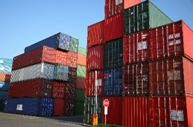
by logisticsplus | Nov 5, 2015 | News
 The International Maritime Organization (IMO.org) has recently approved changes to the Safety of Life at Sea (SOLAS) Convention requiring the verification of container weights. Here are five things shippers should know – and do – in regards to the forthcoming revised rules for container weights:
The International Maritime Organization (IMO.org) has recently approved changes to the Safety of Life at Sea (SOLAS) Convention requiring the verification of container weights. Here are five things shippers should know – and do – in regards to the forthcoming revised rules for container weights:
- Verify All Container Weights!
All shippers will be responsible for verifying the weights of their containers before being loaded aboard any ship. A verified gross mass document should be handed to the shipping line, then the terminal, who will then determine whether or not to accept the container.
- Be Prepared!
The effective date of this new legislation is not until July 1st, 2016, but shippers need to start making arrangements now in order to ensure they are ready when its time.
- Don’t Risk It!
Not declaring the gross mass of your container, may not only lead to its rejection from the terminal but could also cost you a large sum of money in fines, sanctions or in some cases, even jail time.
- Pick A Verified Weighing Option:
Shippers have two options; they can either weigh the entire packed container using certified and calibrated equipment, or they can sum up the weights of each individual item utilizing an approved process.
- Talk To Your Freight Forwarder
If you are using a freight forwarder, make sure they are experienced and reputable (like Logistics Plus), and that you establish a well-founded communication system with them. This way you can ensure compliance on both sides, and prevent non-shipment or delays of any of your goods.
If you have any questions, feel free to contact the international experts at Logistics Plus at pricing@logisticsplus.com or click the button below to get a quick quote on your next international freight shipment.


by logisticsplus | Nov 4, 2015 | News
 One of the primary promises we make to our customers is to deliver their products to the right place, on time and intact. This has enabled Logistics Plus to earn a reputation for great service while growing on a global scale. After establishing offices in the United States, Europe, Asia and Africa, Logistics Plus has added another important region to its global network: the Middle East.
One of the primary promises we make to our customers is to deliver their products to the right place, on time and intact. This has enabled Logistics Plus to earn a reputation for great service while growing on a global scale. After establishing offices in the United States, Europe, Asia and Africa, Logistics Plus has added another important region to its global network: the Middle East.
In 2013, when Imad Murtada first joined Logistics Plus as a business development manager, it only had one logistics agent in the region. It wasn’t long, however, until Imad, who brought with him many years of logistics experience in the region, utilized his connections and expertise to connect the Middle East to the world through Logistics Plus. Today, Logistics Plus operates out of eight offices located in Bahrain, Egypt, Saudi Arabia, Libya and the United Arab Emirates.
“We went from nothing to generating over $1.5 million in revenue from our business in Bahrain and Egypt alone,” says Imad. “This is only the beginning. Some of the largest companies in the region do business with us now. Wescosa and Cristal in Saudi Arabia, and Food National and Transilwrap in Egypt, are just a few examples.”
Operating in the Middle East is not easy: the logistics industry there is competitive and requires extra-ordinary customer service skills. Not to mention the constant demand for high quality services and low rates. “You have to reply to customer e-mails within no more than fifteen minutes,” Imad explains “If you don’t, some other company will take your customer.”
Each country in the Middle East also has its own set of rules, which is why it is very essential that logistics employees are aware of these rules and abide by them. To address cultural differences, Logistics Plus hires professionals that are familiar with these cultures and can speak the local languages fluently.
The number one key to succeeding in the region, according to Imad, is to build solid customer relationships with customers. “Customers in the Middle East value the relationship you have with them,” he says. “If they like you, they will be loyal customers.”
When asked about the political situation, Imad says that although the situation in the Middle East is volatile in some areas, that has not affected existing business. That’s because most shipments are made through either ocean or air freight, and “blacklisted” areas do not even have to be involved in the process. Despite the volatile political situation in some of the regions, business is still flourishing in other parts of the Middle East. In fact, according to the Brookings Institution, this year the city of Dubai was ranked the fifth highest performing metropolitan economy in the world. Last month, Logistics Plus opened its first office there.
Imad is very optimistic about the future of Logistics Plus in the Middle East, and he sees the potential for even more expansion in the region. “We are still relatively new in the area,” Imad says. “We are still building our brand and reputation, and we are doing a great job. As a result, more and more businesses are calling us for logistics solutions in the region.”
For more information about different logistics services in the Middle East, please contact:
Imad Murtada (Business Development Specialist): imad.murtada@logisticsplus.com

by logisticsplus | Oct 27, 2015 | News
 Incoterms® refer to a series of rules that define the responsibilities of sellers and buyers (business-to-business) when they purchase and ship goods internationally. These could include various costs and performance tasks which all businesses involved agree to handle.
Incoterms® refer to a series of rules that define the responsibilities of sellers and buyers (business-to-business) when they purchase and ship goods internationally. These could include various costs and performance tasks which all businesses involved agree to handle.
Background
Incoterms were originally designed by the International Chamber of Commerce, in order to establish a more universal terminology across different members of the international trade industry. They were first introduced in 1936, and are revised as needed. Generally, their life span averages about 10 years. The 2010 Incoterm rules consist of 11 different terms that aid users in dealing with different situations that involve the movement of goods.
Significance
Using Incoterm rules in agreements ensures that both parties are on the same page, thus reducing the possibility of misunderstanding and increasing the likelihood of fulfillment. Incoterm rules are a very significant part of purchase-sales contracts, and it is therefore very essential that both the seller and buyer understand how to use them properly.
General Guidelines
- All Incoterms rules must include the exact geographical place.
- Incoterms must be cited in purchase-sales contracts.
- Incoterm rules are always in English regardless of the contract language.
- Each Incoterm rule has a three letter abbreviation.
- Each Incoterm rule states the location where seller risk (referred to as “delivery”) for the condition agreed upon ends.
- All Incoterm rules require the packaging of goods for transport by the seller.
2010 Incoterm Rules
- Ex Works (EXW): refers to the most basic shipment arrangement, where the seller is only obliged to ensure the packaging and availability of a good and notify the buyer.
- The F-Group (FOB, FAS, FCA): overall, terms in this category indicate that the seller is only responsible for delivering the goods to a carrier determined by the buyer.
- The C- Group (CIP, CPT, CIF, CFR): terms in this category indicate that the seller is obliged to contact and pay for carriage, but is not responsible for cost or risk once the goods are shipped.
- The D- Group (DAF, DES, DEQ, DDU, DDP): terms in this category indicate that the seller is responsible for all costs associated with bringing goods to a certain location determined by the buyer.
Please check out our useful online Incoterms Guide, or contact us for more information. If you have an international shipment ready to go, click the button below to request a free, no-obligation transportation quote.

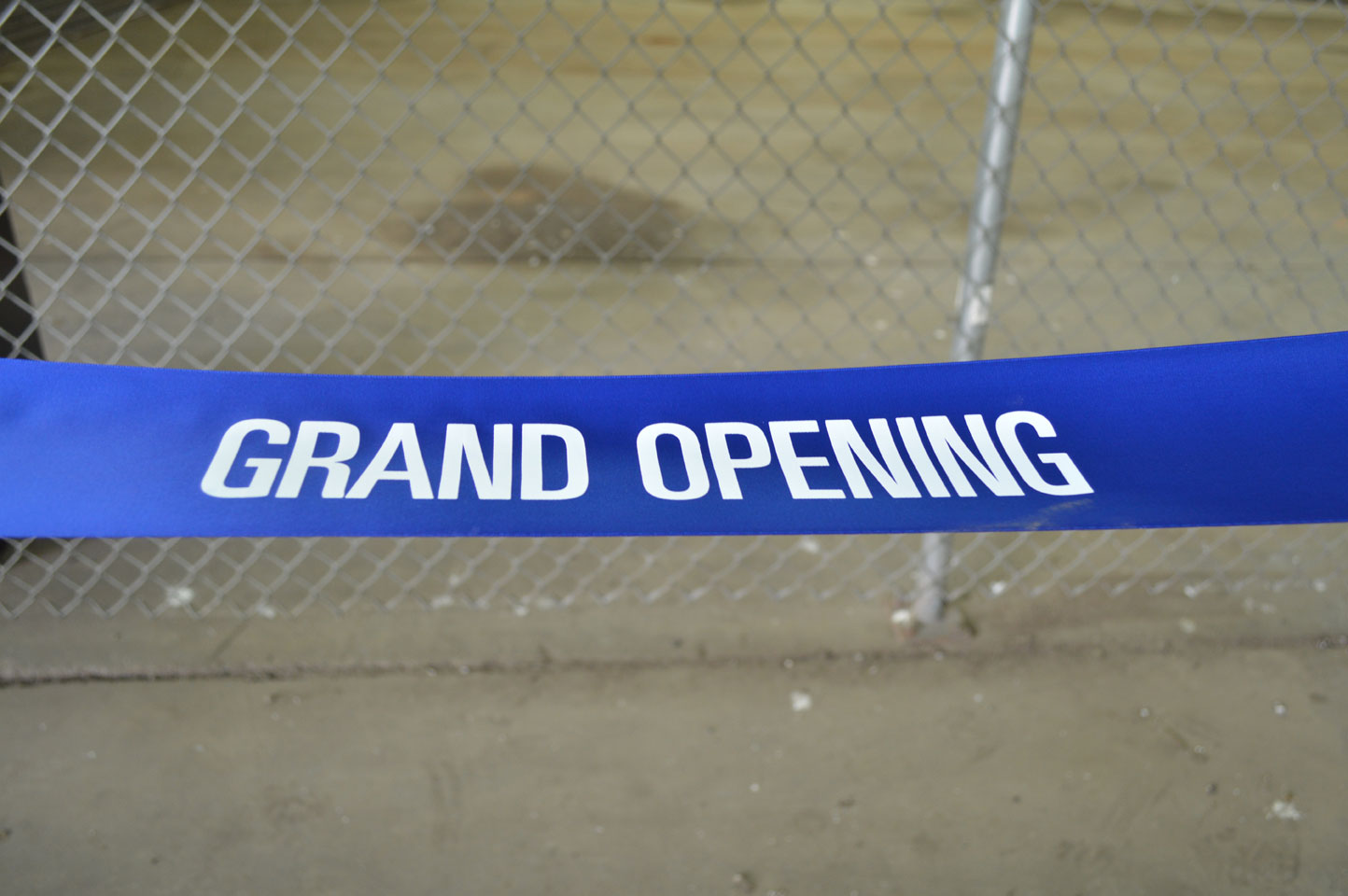
by logisticsplus | Oct 24, 2015 | News
 Thank you to our customers, government officials, media partners, and friends for helping us celebrate the grand opening of the ERI FTZ powered by Logistics Plus! The ribbon has been officially cut, and we are now ready to serve the regional business community by providing access to this general purpose Foreign Trade Zone – along with the world-class warehousing, transportation and logistics services you have come to expect from Logistics Plus!
Thank you to our customers, government officials, media partners, and friends for helping us celebrate the grand opening of the ERI FTZ powered by Logistics Plus! The ribbon has been officially cut, and we are now ready to serve the regional business community by providing access to this general purpose Foreign Trade Zone – along with the world-class warehousing, transportation and logistics services you have come to expect from Logistics Plus!
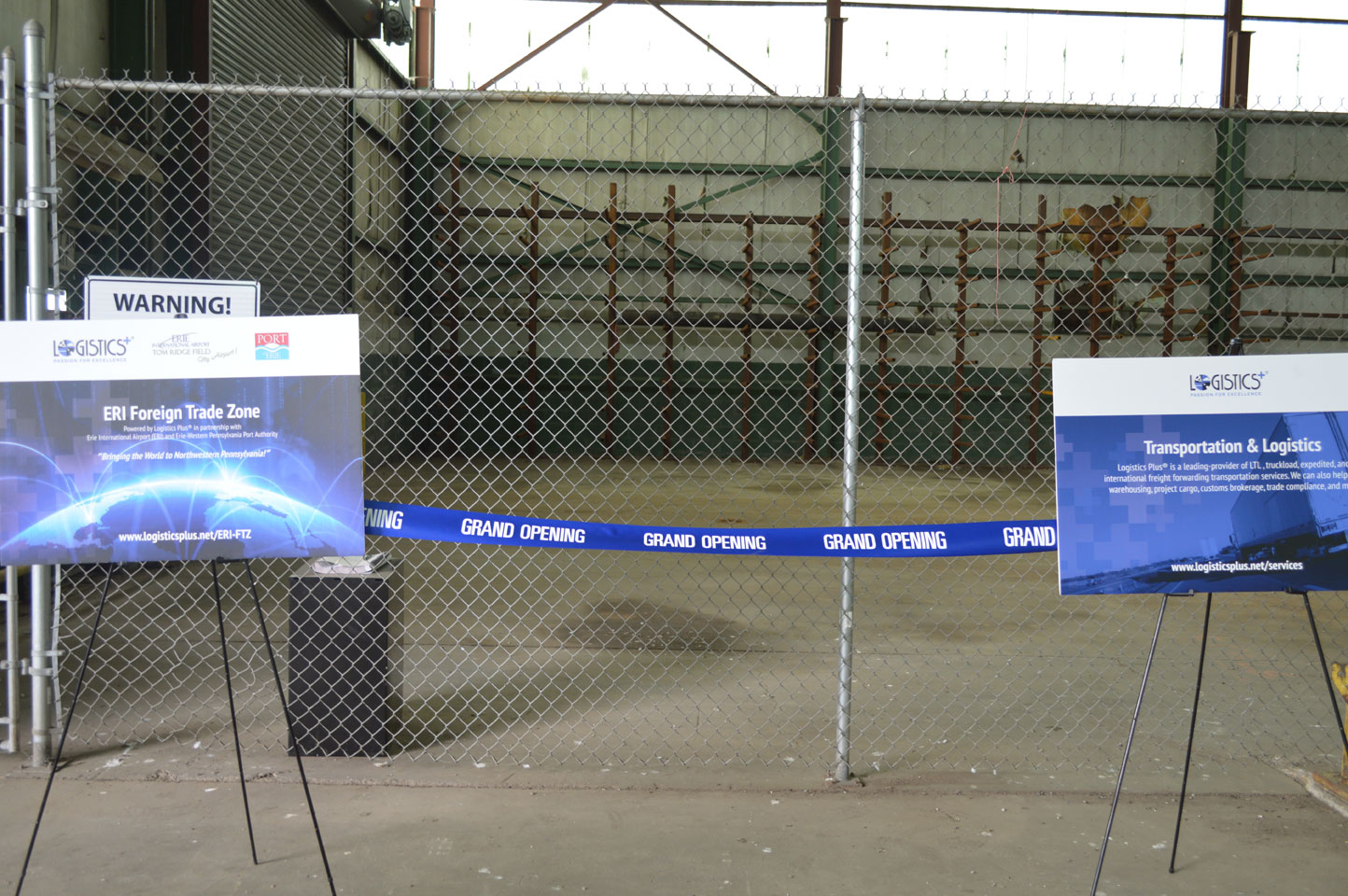
We’d also like to recognize and thank the following individuals that played special roles in bringing this project to life, and for their help and comments at the ribbon-cutting ceremony:
- Chris Rogers, Executive Director, Erie International Airport
- Sheilah Bruno, Chief Financial Officer, Erie International Airport
- Brenda Sandberg, Executive Director, Erie-Western Pennsylvania Port Authority
- Gary Lee, Director of Administration for Erie County (representing County Executive, Kathy Dahlkemper)
- Gretchen Blough, Customs Brokerage Manager, Logistics Plus
- Adam Mook, Compliance Department Manager, Logistics Plus
- Jim Berlin, Founder & CEO, Logistics Plus
Lastly, in case you missed it, click the image below to view local media coverage of the event.
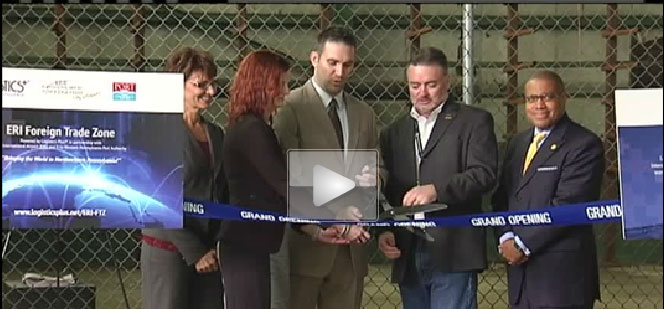
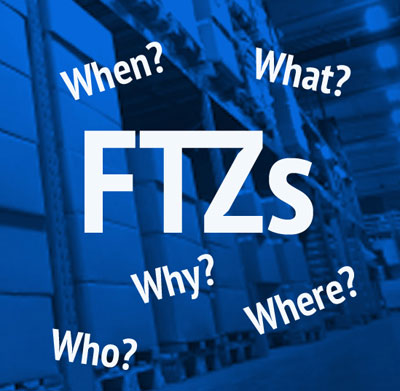
by logisticsplus | Oct 21, 2015 | News
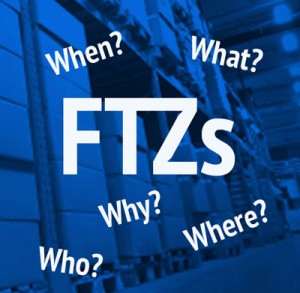 What are Foreign Trade Zones?
What are Foreign Trade Zones?
A Foreign Trade Zone (FTZ) is a secured area, where both domestic and foreign commercial goods receive the same treatment by U.S. Customs and Border Protection as if it were outside the commerce of the United States. This means that merchandise may enter Foreign Trade Zones without a formal customs entry and payment of customs duties.
When were Foreign Trade Zones (FTZs) created?
During the Great Depression, the U.S. Foreign Trade Zones Act of 1934 created the FTZ program in attempts to expedite and encourage foreign commerce, and reduce costs for U.S.-based operations engaged in international trade.
Where are Foreign Trade Zones (FTZs) located?
FTZs are generally located in an area in or adjacent to a United States port of entry, where they are supervised by U.S. Customs and Border Protection. Every state currently maintains at least one FTZ, and some have many more. Today, there are more than 230 general purpose FTZs (those available to more than one company), and nearly 400 subzones (those designated for one company only), that operate in the United States.
Why should you use FTZs?
There are benefits to using Foreign Trade Zones, which include:
- Helping U.S. businesses become more competitive by deferring, reducing, and eliminating custom duties on goods entering FTZs.
- Allowing businesses to hold their goods in an FTZ for an indefinite amount of time, until they are either exported from the U.S. or entered into the U.S.
- Enabling companies to transfer goods within the U.S. to another FTZ (zone-to-zone transfer) and outside the United States, while also reducing manufacturing processing fees.
- Allowing companies to closely track their inventory, thus improving their compliance, inventory tracking, and quality control.
Who should you contact to find out more about FTZs?
Logistics Plus has an activated general-purpose FTZ in Erie, PA, and a soon-to-be-activated FTZ in Dallas/Fort Worth, TX. If you have questions or would like to learn more about Foreign Trade Zones, feel free to contact either of these Logistics Plus FTZ experts:

 The International Maritime Organization (IMO.org) has recently approved changes to the Safety of Life at Sea (SOLAS) Convention requiring the verification of container weights. Here are five things shippers should know – and do – in regards to the forthcoming revised rules for container weights:
The International Maritime Organization (IMO.org) has recently approved changes to the Safety of Life at Sea (SOLAS) Convention requiring the verification of container weights. Here are five things shippers should know – and do – in regards to the forthcoming revised rules for container weights:








